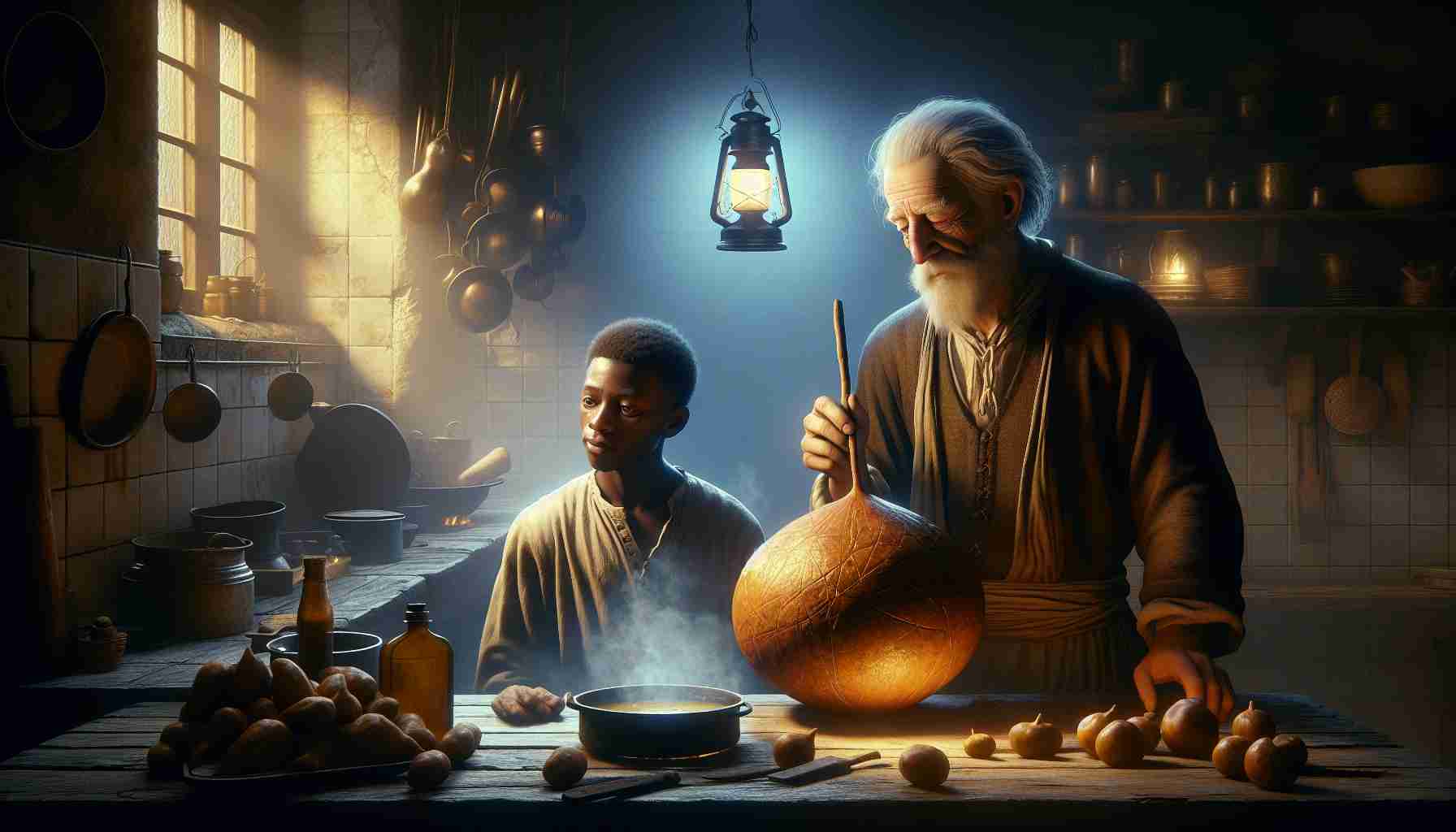

The first time I saw Master Tuan’s cooking gourd, I thought it was the ugliest, most useless thing I’d ever seen. It was huge—bigger than my head!—but it couldn’t hold water, leaned to one side, and had a crack right down its middle. Still, Master Tuan cradled it like it was treasure.
“Why do you keep that broken thing?” I asked boldly. I had just begun as his kitchen apprentice. My name is Min, and I was 9 years old then, always trying too hard to impress him.
He chuckled and placed the gourd on the counter. “Some things look empty, Min, but that’s only because they’ve let go of what they don’t need.”
I didn’t understand. Cooking was serious—measuring, timing, slicing perfectly thin carrots. But Master Tuan seemed to break every rule. He tossed herbs in with his eyes closed. He stirred soups while humming. People came from all over the village to eat his food, saying it tasted like home—even if they were strangers far from it.
One afternoon after the morning market, he handed me the old gourd. “You’ll cook today.”
My heart jumped. “But with this?”
“It’s a good day to learn freedom,” he said with a wink.
I didn’t even know where to start. The pot tipped, the handle wobbled, and the broth spilled too easily. I tried again—slower. Still not right. I wiped my hands and frowned.
“I need a better tool!” I snapped.
Master Tuan leaned on his walking stick. “Better tools don’t make better cooks. A tool becomes great when we stop fighting it.”
I didn’t get it. But I watched him closely. Each time the gourd tilted, he didn't resist—it became part of the way he moved. When it wobbled, he danced with it as though they were old friends. Without struggle, the soup flowed exactly where it needed to.
That night, I sat beside the empty gourd under the stars. I thought about how often I had tried to force things—cut straight lines, be the fastest, prove I was best. But the empty gourd didn't try to be anything. It just was.
The next morning, I cooked again. This time, I didn’t rush. I let the gourd move the way it wanted. I worked with it, not against it. And somehow, the broth tasted richer, deeper—like the river after a long rain.
“Not bad,” said Master Tuan, smiling. “Now you’re beginning to cook the Tao.”
I blinked. “The… Tao?”
“The Way,” he said simply. “Through simplicity, we find everything we need. Through emptiness, we hold the most.”
Years passed. I no longer feared crooked spoons or odd-shaped bowls. I learned to see their beauty. That broken gourd became my favorite.
I didn’t change overnight. But now, whenever I feel the urge to control everything, I remember the gourd. I breathe. I pause. I let things unfold.
And somewhere in the quiet between stirring and waiting, I hear the Tao guiding me still.
The first time I saw Master Tuan’s cooking gourd, I thought it was the ugliest, most useless thing I’d ever seen. It was huge—bigger than my head!—but it couldn’t hold water, leaned to one side, and had a crack right down its middle. Still, Master Tuan cradled it like it was treasure.
“Why do you keep that broken thing?” I asked boldly. I had just begun as his kitchen apprentice. My name is Min, and I was 9 years old then, always trying too hard to impress him.
He chuckled and placed the gourd on the counter. “Some things look empty, Min, but that’s only because they’ve let go of what they don’t need.”
I didn’t understand. Cooking was serious—measuring, timing, slicing perfectly thin carrots. But Master Tuan seemed to break every rule. He tossed herbs in with his eyes closed. He stirred soups while humming. People came from all over the village to eat his food, saying it tasted like home—even if they were strangers far from it.
One afternoon after the morning market, he handed me the old gourd. “You’ll cook today.”
My heart jumped. “But with this?”
“It’s a good day to learn freedom,” he said with a wink.
I didn’t even know where to start. The pot tipped, the handle wobbled, and the broth spilled too easily. I tried again—slower. Still not right. I wiped my hands and frowned.
“I need a better tool!” I snapped.
Master Tuan leaned on his walking stick. “Better tools don’t make better cooks. A tool becomes great when we stop fighting it.”
I didn’t get it. But I watched him closely. Each time the gourd tilted, he didn't resist—it became part of the way he moved. When it wobbled, he danced with it as though they were old friends. Without struggle, the soup flowed exactly where it needed to.
That night, I sat beside the empty gourd under the stars. I thought about how often I had tried to force things—cut straight lines, be the fastest, prove I was best. But the empty gourd didn't try to be anything. It just was.
The next morning, I cooked again. This time, I didn’t rush. I let the gourd move the way it wanted. I worked with it, not against it. And somehow, the broth tasted richer, deeper—like the river after a long rain.
“Not bad,” said Master Tuan, smiling. “Now you’re beginning to cook the Tao.”
I blinked. “The… Tao?”
“The Way,” he said simply. “Through simplicity, we find everything we need. Through emptiness, we hold the most.”
Years passed. I no longer feared crooked spoons or odd-shaped bowls. I learned to see their beauty. That broken gourd became my favorite.
I didn’t change overnight. But now, whenever I feel the urge to control everything, I remember the gourd. I breathe. I pause. I let things unfold.
And somewhere in the quiet between stirring and waiting, I hear the Tao guiding me still.